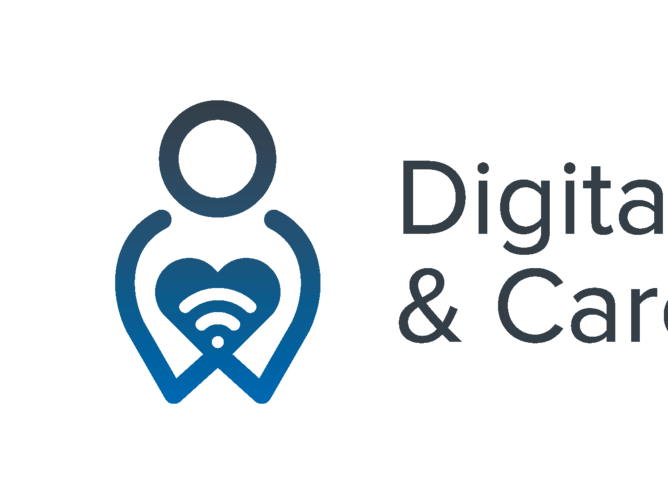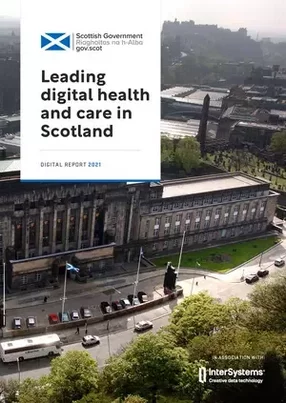Scottish Government: Leading digital health in Scotland
Jonathan Cameron is the Interim Director for Digital Health and Care for the Scottish Government, responsible for the overall strategy for digital health and care across the whole of Scotland. His role includes the commissioning and delivery oversight of major programmes that improve the health and wellbeing of Scottish citizens through digital means, linking the health and care sectors and delivery partners from the statutory, private, third sector, innovation and academic fields. More recently, he has also been responsible for many of the COVID-19 digital tools and apps delivered to support the pandemic response, work that is also guided by the Digital Health & Care Strategy.
Cameron’s team ( made up of 76 staff - 26 of whom are Scottish Government employees) advises Scottish ministers on policy and strategy, and ensures funding is effectively allocated to achieve ministerial priorities; the Directorate has a budget of just over £100 million and responsibility for oversight of hundreds of millions of NHS IT spend.
Scotland has in fact been working on digital health approaches since the 1990s, beginning with the ambition to use eHealth. "For a long time, there's been a recognition of the importance of digital healthcare, not just for the day-to-day work of clinicians, but also just in terms of changing outcomes for patients and making a difference for healthier lives," Cameron says.
Driving the digital strategy
The last decade has seen a big push to drive a digital agenda, with Scotland’s first Digital Health & Care Strategy published in 2018. It was a bold and ambitious strategy that recognised care for the people in Scotland can, and should, be enhanced and transformed through the use of digital technology. What the 2018 strategy could not have envisaged is the pace and scale of change brought about by the coronavirus pandemic. This necessitated a rapid expansion and use of a wide variety of digital tools to support the continued safe and effective delivery of care, hence the need for a refresh of the strategy to reflect these advances and build on successes.
The refreshed strategy is underpinned by the "Once for Scotland" approach, which exists to avoid duplication of work.
"The Once for Scotland approach is about trying to reduce duplication and make sure that we work and collaborate together” Cameron says.. “That's underpinned by the sharing of standards or the agreement to use open standards where possible. The approach is about more than saving money, it is about ensuring better outcomes for people"
“Many of the challenges in implementing a digital approach are around people/organisations using different systems, different standards and different software. We are working hard to ensure better inter-operability and consistent standards across the sector and across systems.”
“The clinical element to that is really important as well, as our clinicians are a critical part of our team and help us drive forward our digital journey. It's very much a partnership in collaboration, whether it's with citizens, the clinicians, or those on the frontline that need to use these tools."
Currently one of the Directorate's long term partners is software vendor InterSystems, who has been providing services for around 15 years.
"InterSystems are the provider across the vast majority of our hospitals, so it fits our Once for Scotland approach. They underpin much of what we're doing, not just around acute care, but supporting data too, providing access so that data can be shared across Scotland. They are critical to our delivery of patient care and are a long-standing strategic partner for Scotland."
Linking health and social care
A key part of the strategy is the link-up of health and social care. “We're very keen to ensure we continue to bring health and care together so that it's centred around the citizen, so what drives our strategy is really just doing the right thing, and the desire to link up different sources of information and different areas," Cameron adds.
This ties in with the strategy’s commitment to improving health and wellbeing outcomes for citizens. "We've been focusing on digital citizens, and during COVID around how we engage with people, with a particular focus on bridging the digital divide and reducing the inequalities that exist. How do we encourage more people to become digitally confident, and how do we support them on their journey towards that? What drives that is choice, so we do recognise that not absolutely everybody will be able to or want to use digital," Cameron says.
There is work in progress to ensure people who want to access health and care services digitally are able to, while Cameron and his team are also working with partners through the Connecting Scotland programme to build skills and access to digital services.
Building digital skills
The Digital Health and Care Directorate had also been working on the idea of a digital workforce for several years before the pandemic. Its aim is to develop the digital skills of staff, build confidence and promote digital as the right approach. To do this the Directorate is working with Scotland’s university and college sector on pre-qualification skills.
The pandemic meant this became a standard way of working, and Cameron tentatively says it is here to stay. "I fully expect greater use of webinars and hybrid events, and that applies to the delivery of training as well as the use of digital tools. We're looking forward to building on what we've done before and continuing to mature not only the skills that people have, but also encouraging people to think digitally and about what that could bring to changing processes."
This will take time, he says, but COVID-19 has presented a real opportunity to accelerate it. "It's opened up greater flexibility, as people don't have to worry about traveling to get together. But inclusion is hard to gauge, and there will be groups of people who have found it challenging, that find it hard to engage via digital channels or who may have broadband difficulties. It's a little hard sometimes to understand who's been left behind, and we really don't want anyone to be left behind. But I do suspect as we come out of the COVID-19 response and into more of a business as usual recovery, that there will be people who say they really struggled and want to be back in the office full time or need more support. But I think that overall, people have really embraced digital and have worked incredibly hard during the last year and a half to deliver care across Scotland."
Adoption of digital services
One example of people successfully embracing digital healthcare is the NHS Near Me service, a video consultation platform available only in Scotland. Cameron says that usage prior to the pandemic was low - there were around 300 Near Me consultations a week before March 2020, rising to nearly 17,000 a week by June. "We've actually just had our millionth video consultation. The platform is a great example of something we had in our toolbox that we were able to pull out and support patients with.”
"We've had technology-enabled care programmes for well over 10 years," Cameron adds. "I think that reflects the remote and rural nature of Scotland. If you're in the Western Isles or in Orkney and Shetland, for example, getting access to certain clinicians can be very challenging. You've got to work in very imaginative ways. We've had great take-up in terms of things like blood pressure monitoring services and, more recently, on Chronic Obstructive Pulmonary Disease (COPD), so people don't need to come into hospital for a routine check-up because they can rely on the equipment and the digital readout of how the patient reports they are feeling.”
"The consultant can see them without having to necessarily see them face-to-face. We've saved a number of acute visit follow-ups that way."
Another benefit of video consultations has been reducing the impact of conventional healthcare services on the environment “We actually had the concept of Health Miles before COVID-19. We’ve had tremendous success reducing journeys by using video consulting, and I think it's a great example of how we’re supporting environmental efforts going into COP26. Digital health and care has a big role to play in this, which we’ve shown through the work we've done with Oxford University on Near Me.”
A data-driven approach
Cameron and his team are about to embark on a consultation for a data strategy, which will be Scotland’s first-ever dedicated Data Strategy for Health and Social Care. This will include detailed consideration of how to increase citizens’ trust and transparency in data sharing, as well as addressing issues around ethics and legislative requirements. "We want to have that conversation about how to use data safely, and to discuss what is ethically the right thing to do. We actually put an ethics framework in place as part of our COVID-19 work. I think the foundations of ethics and information governance need to be in place before you get into things like AI. Trying to make data-driven decisions, and using data as a way of driving innovation runs through a lot of what we do in Scotland.”
This work is being led by the Data Lab, Scotland's Innovation Centre for Data and AI. “Our idea is that we will join up data in lots of different ways to drive better outcomes for patients, or better decision-making from clinicians or simply just putting people in touch with each other” Cameron says. “It's often not the really complex world of machine learning and AI that makes the difference, it’s simply people being able to understand who's there and what services are available.”
Separately from the Data Lab, Scotland has the Digital Health and Care Innovation Centre (DHI), which exists to enable the Scottish Government to engage with suppliers, and as Cameron explains, “understand the maturity of different products, and in some cases actually use it as a sandbox environment to actually prove that something will work. I think the challenge that a lot of suppliers have is duplication and overlap and sometimes they have a lack of clarity about what the problem is they're trying to solve.”
“AI is a great example - the number of times I've seen a great presentation of an AI platform but what is it going to do for the patient or the clinician?
The future for Scotland’s healthcare
Cameron says his team welcomes innovation. “We are really encouraging of any company or potential supplier coming to Scotland. We’re open to innovation and new ideas, and are seeking to be a leader in the use of data in healthcare. Part of our wider strategy is going beyond health and the immediate challenge of supporting patients and clinicians is to supporting the economy and climate change as well.”
Looking ahead, Cameron says that their first goal is recovery. "We need to recognise that we are facing a real challenge in terms of people who've had to pause their care, and they need that restarted again. Our immediate goals are around getting back to whatever a normal state may be, but we need to focus them away from corporate greed. In terms of long term goals, I think we will certainly have gone a long way to achieving them if we are able to put the patient at the centre of their care, in charge of their care and potentially able to direct it, or at the very least have a personalised experience.”
“We're looking at genomics and other examples of how we can personalise medicine so that it results in a better outcome for patients. I think digital will absolutely be at the forefront of helping people towards that."
Read the full story HERE.



